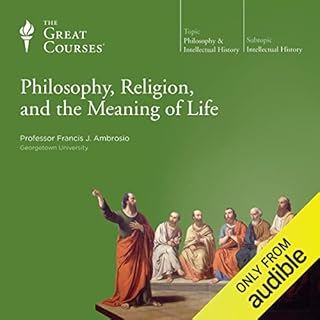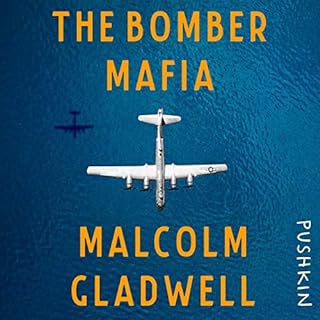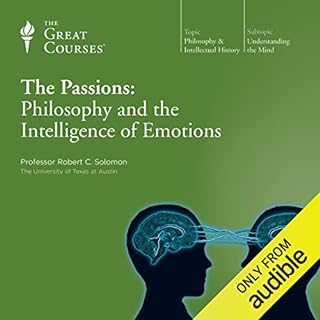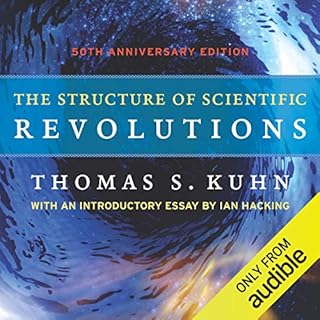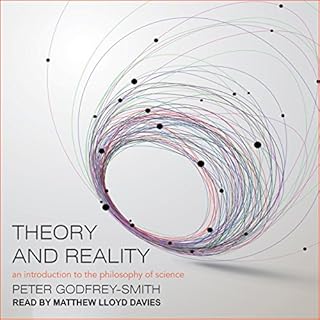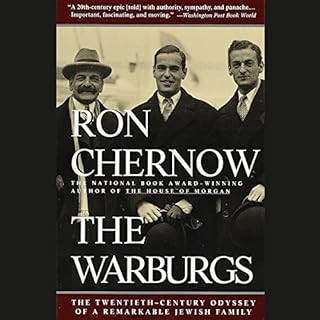Market Maven
- 39
- reviews
- 132
- helpful votes
- 81
- ratings
-
A History of Western Philosophy and Theology
- By: John M. Frame
- Narrated by: Tom Parks
- Length: 23 hrs and 2 mins
- Unabridged
-
Overall4.5 out of 5 stars 65
-
Performance5 out of 5 stars 57
-
Story5 out of 5 stars 57
A History of Western Philosophy and Theology is the fruit of John Frame's 45 years of teaching philosophical subjects. No other survey of the history of Western thought offers the same invigorating blend of expositional clarity, critical insight, and biblical wisdom.
-
1 out of 5 stars
-
Arrogance at its best
- By Justin M. Rogers on 08-05-22
- A History of Western Philosophy and Theology
- By: John M. Frame
- Narrated by: Tom Parks
Title a Misnomer
Reviewed: 11-19-23
I purchased this audio book because I enjoy various "history of philosophy" courses in the Great Course series. However this work is presented purely from a tradition Christian standpoint, and not a philosophical one. Frame does cover all the bases, but always brings it back to his Christian worldview, which is a shame. It is not even an apologetic, in that he does not defend his Christian position, but just states it, without any backup, again and again. I stayed with the book until the end, just to see how he would handle the various philosophers and Christian thinkers. My take is that he is too quickly dismissive of the Plato, Kant, and Hegel, and spends too much time on more contemporary thinkers, including some of his own associates. He even closes the work with a call to confess one's sins and come to accept Jesus as lord. Buyer beware.
Something went wrong. Please try again in a few minutes.
You voted on this review!
You reported this review!
1 person found this helpful
-
Philosophy, Religion, and the Meaning of Life
- By: Francis J. Ambrosio, The Great Courses
- Narrated by: Francis J. Ambrosio
- Length: 18 hrs and 39 mins
- Original Recording
-
Overall4.5 out of 5 stars 144
-
Performance4.5 out of 5 stars 122
-
Story4.5 out of 5 stars 123
What is the meaning of life? Is human existence meaningful or absurd? If you've ever pondered these questions, you have an extraordinary adventure in store, as an award-winning teacher presents a boldly revealing inquiry into these most fundamental of human concerns. In this inspiring series of 36 lectures, Professor Ambrosio charts how these questions have been pursued and grasped through the ages, providing you with the understanding and the tools to come to terms with them in a direct, practical way.
-
1 out of 5 stars
-
This cannot be a real course.
- By Amazon Customer on 12-19-17
Better than many of the reviews.
Reviewed: 02-11-23
I have done a considerable number of Great Courses in history and philosophy, and I found this one to be quite good. Some suffer from being to "classroom," just covering the main bullet points, where others wander all over the place, This comines both. Prof. Ambrosia brings his own knowledge to the table here when examining the various traditions, while leaving the student to come to their own conclusions. He covers all the basis here. Highly recommend.
Something went wrong. Please try again in a few minutes.
You voted on this review!
You reported this review!
-
Too Big to Fail
- The Inside Story of How Wall Street and Washington Fought to Save the Financial System--and Themselves
- By: Andrew Ross Sorkin
- Narrated by: William Hughes
- Length: 21 hrs and 4 mins
- Unabridged
-
Overall4.5 out of 5 stars 2,877
-
Performance4.5 out of 5 stars 1,993
-
Story4.5 out of 5 stars 1,985
A real-life thriller about the most tumultuous period in America's financial history by an acclaimed New York Times reporter. Andrew Ross Sorkin delivers the first true, behind-the-scenes, moment-by-moment account of how the greatest financial crisis since the Great Depression developed into a global tsunami.
-
5 out of 5 stars
-
Best Book About Meltdown
- By Chuck on 12-08-09
- Too Big to Fail
- The Inside Story of How Wall Street and Washington Fought to Save the Financial System--and Themselves
- By: Andrew Ross Sorkin
- Narrated by: William Hughes
Great inside look, but glossed over bank problems
Reviewed: 12-07-22
Some exceptional reporting here. Just one complaint. Mr. Sorkin does not spend hardly any time at all undercoving the causes of the Great Financial Crises itself. Michael Lewis's book, "The Big Short," does this in spades. "Too Big To Fail " is all about how government dealt with the problem, but very little on how the problem arose in the first place. And there were gross errors, and perhaps crimes, that caused it. And no one at the banks suffered. Only American home owners. A lot of the unrest we see today is a direct result of this.
Something went wrong. Please try again in a few minutes.
You voted on this review!
You reported this review!
-
The Bomber Mafia
- A Dream, a Temptation, and the Longest Night of the Second World War
- By: Malcolm Gladwell
- Narrated by: Malcolm Gladwell
- Length: 5 hrs and 14 mins
- Unabridged
-
Overall4.5 out of 5 stars 9,119
-
Performance5 out of 5 stars 7,832
-
Story4.5 out of 5 stars 7,783
Malcolm Gladwell, author of New York Times best sellers including Talking to Strangers and host of the podcast Revisionist History, uses original interviews, archival footage, and his trademark insight to weave together the stories of a Dutch genius and his homemade computer, a band of brothers in Central Alabama, a British psychopath, and pyromaniacal chemists at Harvard. As listeners hear these stories unfurl, Gladwell examines one of the greatest moral challenges in modern American history.
-
3 out of 5 stars
-
Listen to the same story on his podcast for free
- By Dustin on 04-28-21
- The Bomber Mafia
- A Dream, a Temptation, and the Longest Night of the Second World War
- By: Malcolm Gladwell
- Narrated by: Malcolm Gladwell
Another great work by Mr. Gladwell.
Reviewed: 05-14-21
I loved this audio book. If you are a Gladwell fan, you will as well. I learned so much about WWII. One comment though - this was an audiobook before it was a book. There is music and recordings. Which all is great. However, there were annoying pauses between chapters, with no music. Just silence Sometimes these could last 10-15 seconds which is a very long time when listening. I though my battery ran dead! If I didn't know better, I would think that they were intentionally trying to pad the length of the audiobook. I would correct this going forward. Otherwise all great!
Something went wrong. Please try again in a few minutes.
You voted on this review!
You reported this review!
-
War, Peace, and Power: Diplomatic History of Europe, 1500-2000
- By: Vejas Gabriel Liulevicius, The Great Courses
- Narrated by: Vejas Gabriel Liulevicius
- Length: 18 hrs and 41 mins
- Original Recording
-
Overall4.5 out of 5 stars 578
-
Performance4.5 out of 5 stars 512
-
Story4.5 out of 5 stars 511
For much of the past five centuries, the history of the European continent has been a history of chaos, its civilization thrown into turmoil by ferocious wars or bitter religious conflicts - sometimes in combination - that have made and remade borders, created and eliminated entire nations, and left a legacy that is still influencing our world.This 36-lecture series from an award-winning teacher and honored scholar pursues an explanation for this chaos that goes beyond the obvious ones of political ambition, religious intolerance, the pursuit of state power, or the fear of another state's aspirations.
-
5 out of 5 stars
-
500 Years That Shook the World
- By Jeff on 10-08-14
Excellent Historical Review
Reviewed: 12-20-20
I highly recommend this Great Course. It is incredible how Prol. Liulevicius covers such a large amount of history while keeping it coherent. He achieves this by structuring it around key themes, for example the balance of power. This course also sets the stage for the World Wars of the 20th century. And also, his review of the Cold War is very good. I never knew how much was going on during this period that I actually lived through. Anyone will come away with a much better understanding of this part of the world after listening to this course.
Something went wrong. Please try again in a few minutes.
You voted on this review!
You reported this review!
1 person found this helpful
-
Great Minds of the Eastern Intellectual Tradition
- By: Grant Hardy, The Great Courses
- Narrated by: Grant Hardy
- Length: 18 hrs and 36 mins
- Original Recording
-
Overall4.5 out of 5 stars 1,094
-
Performance4.5 out of 5 stars 958
-
Story4.5 out of 5 stars 945
Western philosophy is a vast intellectual tradition, the product of thousands of years of revolutionary thought built up by a rich collection of brilliant minds. But to understand the Western intellectual tradition is to get only half the story. The Eastern intellectual tradition has made just as important a contribution-and is also the product of thousands of years of cumulative thought by a distinct group of brilliant thinkers. Their ideas demonstrate wholly different ways of approaching and solving the same fundamental issues that concerned the West's greatest thinkers, such as . the existence of God; . the meaning of life; and. the nature of truth and reality.This epic and comprehensive 36-lecture examination of the East's most influential philosophers and thinkers-from a much-honored teacher and scholar-offers a thought-provoking look at the surprising connections and differences between East and West. By introducing you to the people-including The Buddha, Ashoka, Prince Shotoku, Confucius, and Gandhi-responsible for molding Asian philosophy and for giving birth to a wide variety of spiritual and ideological systems, it will strengthen your knowledge of cultures that play increasingly important roles in our globalized 21st-century world.
-
1 out of 5 stars
-
Not what I expected
- By John on 11-06-14
Great Instructor, But A Mile Wide and Inch Deep
Reviewed: 11-23-20
First the good news. Professor Hardy is an outstanding lecturer. Truly one of the best I have heard in the Great Courses, and I have done many. He brings an excitement to the material, is wonderful to listen to, and communicates clearly and effectively. I did learn a new perspective of the East from this course, one that we too often ignore in the West. However, the chief problem I had was that just too many "great minds" were covered. So many in fact that you easily lose any perspective after a while. He sets it up as Indian and Chinese camps, but there was an intermingling of Buddhism, so even that got confusing. It was almost like reading an encyclopedia entry for an individual. Just the bare facts, then move on to the next. It was hard to see any large trends in thinking. Professor Hardy worried that he may not have included all the 'great minds." However, he would have been better off reducing the number from 30 or 40 down to maybe 10-12. In that way we could better see how the East dealt with the major philosophical issues he lays out in the beginning. I would still recommend this book however, as it does recap all of Eastern thinking, which can be beneficial to study, and because of the strength and energy of Prof. Hardy.
Something went wrong. Please try again in a few minutes.
You voted on this review!
You reported this review!
4 people found this helpful
-
The Passions: Philosophy and the Intelligence of Emotions
- By: Robert C. Solomon, The Great Courses
- Narrated by: Robert C. Solomon
- Length: 12 hrs and 37 mins
- Original Recording
-
Overall4.5 out of 5 stars 598
-
Performance4.5 out of 5 stars 526
-
Story4.5 out of 5 stars 516
Conventional wisdom suggests there is a sharp distinction between emotion and reason. Emotions are seen as inferior, disruptive, primitive, and even bestial forces. These 24 remarkable lectures suggest otherwise-that emotions have intelligence and provide personal strategies that are vitally important to our everyday lives of perceiving, evaluating, appraising, understanding, and acting in the world.
-
5 out of 5 stars
-
Feel good and be good
- By Gary on 11-24-18
A Mile Wide and Inch Deep
Reviewed: 10-20-20
First let me say that I am a fan of Prof. Solomon, having completed two previous "Great Courses" of his, one on Existentialism, and one on Nietzsche. However, I felt that this particular course was not up to standard. To begin with, it is much more a psychology course that a philosophy course. So much of it just seems to be an inventory of human emotions. Solomon is an excellent lecturer, so the course is never boring. However I was expecting more. I would have eliminated over 2-3rds of the topics, and concentrated on one-third and gone much more in depth. So many topics are brought up only to be discarded after a few brief comments. For example he claims envy is the one emotion that is never positive. And doesn't really back it up. When I was starting my career I was envious of those with more money that could do more things in life than me. This motivated me. Nothing wrong with that. Another example is deja vu. He brings it up, but never really explains it. And finally, I don't think he adequately address the premise of the entire course, that emotions are intelligent. I am not saying there is no such thing as emotional intelligence, but Solomon did not go deep enough into what this means. To sum up, this is an important topic that deserves more depth than presented here..
Something went wrong. Please try again in a few minutes.
You voted on this review!
You reported this review!
16 people found this helpful
-
The Structure of Scientific Revolutions
- By: Thomas S. Kuhn
- Narrated by: Dennis Holland
- Length: 10 hrs and 14 mins
- Unabridged
-
Overall4 out of 5 stars 1,156
-
Performance4 out of 5 stars 834
-
Story4 out of 5 stars 816
A good book may have the power to change the way we see the world, but a great book actually becomes part of our daily consciousness, pervading our thinking to the point that we take it for granted, and we forget how provocative and challenging its ideas once were - and still are. The Structure of Scientific Revolutions is that kind of book.
-
3 out of 5 stars
-
The problem is not with the book
- By Marcus on 08-09-09
- The Structure of Scientific Revolutions
- By: Thomas S. Kuhn
- Narrated by: Dennis Holland
A Classic.
Reviewed: 10-19-20
This is a must read for anyone interested in science, and in particular, the philosophy of science. This book is so well regarded that there is little I can say to add. Also, the reader was excellent. I would also suggest reading/listening to this before other works on the philosophy of science, as they will refer to this work often, and you are better off having it under your belt before investigating other works.
Something went wrong. Please try again in a few minutes.
You voted on this review!
You reported this review!
1 person found this helpful
-
Theory and Reality
- An Introduction to the Philosophy of Science
- By: Peter Godfrey-Smith
- Narrated by: Matthew Lloyd Davies
- Length: 10 hrs and 29 mins
- Unabridged
-
Overall4.5 out of 5 stars 168
-
Performance4.5 out of 5 stars 142
-
Story4.5 out of 5 stars 140
How does science work? Does it tell us what the world is "really" like? What makes it different from other ways of understanding the universe? In Theory and Reality, Peter Godfrey-Smith addresses these questions by taking the listener on a grand tour of 100 years of debate about science. The result is a completely accessible introduction to the main themes of the philosophy of science.
-
3 out of 5 stars
-
First 75% Really Great. Last Part Not as Much.
- By Market Maven on 10-04-20
- Theory and Reality
- An Introduction to the Philosophy of Science
- By: Peter Godfrey-Smith
- Narrated by: Matthew Lloyd Davies
First 75% Really Great. Last Part Not as Much.
Reviewed: 10-04-20
This is the fourth book on the philosophy of science that I have read. I found Prof. Godfrey-Smith's review of the field to be excellent, probably the best I have read. However, in the latter part of the book, he delves into his own beliefs, and this is where I felt the book dropped. After covering the very interesting work in the philosophy of science, he concludes the book by presenting his own beliefs, which turn out to be that of naturalism and materialism. I felt there were too many "I" statements in the latter part. He also seems to have ignored the issues involved in the hard problem of consciousness in this final section. I still find Thomas Kuhn's Structure of Scientific Revolutions to stand alone in the philosophy of science. Godfrey-Smith covers this work, but doesn't accept Kuhn's view that revolutions in science lead to truly different worlds. Our world is what we think it is. But I would still recommend this book for great review of the philosophy of science. And the narrator was quite good as well,
Something went wrong. Please try again in a few minutes.
You voted on this review!
You reported this review!
6 people found this helpful
-
The Warburgs
- The Twentieth-Century Odyssey of a Remarkable Jewish Family
- By: Ron Chernow
- Narrated by: Jonathan Reese
- Length: 35 hrs and 21 mins
- Unabridged
-
Overall4.5 out of 5 stars 498
-
Performance4 out of 5 stars 439
-
Story4.5 out of 5 stars 432
Bankers, philanthropists, scholars, socialites, artists, and politicians, the Warburgs stood at the pinnacle of German (and, later, German American) Jewry. They forged economic dynasties, built mansions and estates, assembled libraries, endowed charities, and advised a German kaiser and two American presidents. But their very success made the Warburgs lightning rods for anti-Semitism, and their sense of patriotism became increasingly dangerous in a Germany that had declared Jews the enemy.
-
4 out of 5 stars
-
The Warburg's Dynamic Family History
- By Darwin8u on 10-22-18
- The Warburgs
- The Twentieth-Century Odyssey of a Remarkable Jewish Family
- By: Ron Chernow
- Narrated by: Jonathan Reese
Amazing History of 20th Century Jews
Reviewed: 09-13-20
I am a big fan of Ron Chernow, the author, and I had previously read all of his books, except this. So I gave it a shot. I found it really fascinating, although I must say that I found the family lineage confusing most of the time. Particularly in the beginning, There were so many cousins, etc. that I wondered if it would be more than just a cute family album. But as the German Warburgs got nearer to the rise of Hitler, the story becomes compelling. And the portraits of several of the Warburg bankers, both in the U.S. and in Germany are quite interesting. I am not Jewish, but I would recommend this highly to my Jewish friends for its unique understanding of German Jews prior to WWII. I wish more had been covered on just how they made their money over many decades. Chernow did a better job of this with The House of Morgan and Titan, the Life of John D. Rockefeller. Chernow covers Siegmund Warburg's business rise in post war London very well, but others not so well, in terms of their business dealings. But I guess there is only so much one can cover in a long book. I thought the book's ending could have had a better summary, and it seems Chernow's comments on he death of Siegmund was the true "ending." I remain a Chernow fan after reading this book. One last comment - I noticed some reviewers pan the narrator. I disagree. He was more than adequate.
Something went wrong. Please try again in a few minutes.
You voted on this review!
You reported this review!
2 people found this helpful


